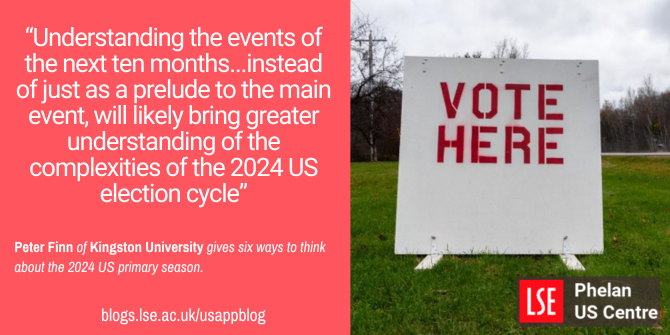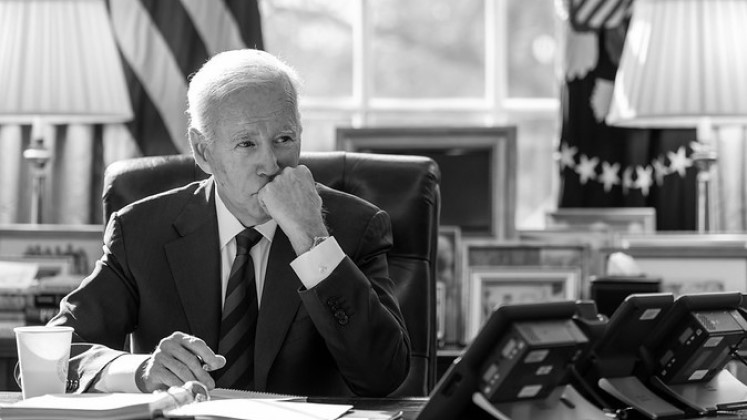 The 2024 primary season is finally here, but there are multiple ways to think about the processes in the Democratic and Republican parties that will dominate the next six months of US politics. Peter Finn looks at the different ways to think about the primaries.
The 2024 primary season is finally here, but there are multiple ways to think about the processes in the Democratic and Republican parties that will dominate the next six months of US politics. Peter Finn looks at the different ways to think about the primaries.
- This article is part of ‘The 2024 Elections’ series curated by Peter Finn (Kingston University). Ahead of the 2024 election, this series is exploring US elections at the state and national level. If you are interested in contributing to the series, contact Peter Finn (p.finn@kingston.ac.uk).
For the next six months the US primary season will dominate the US political news cycle. Yet, how people interpret the many primaries and caucuses that will occur will be influenced by their prior thoughts on the current state of US politics and their interests in the nuances of state level politics. If all this seems overwhelming at this stage, here are six ways you can think about the primary season:
1) Democracy in action (or not)
Though turn out for primaries and caucuses falls far below what can be expected for the General Election on November 5th, the size and scale of the US means that there will still be tens of millions taking part in the 2024 iteration of the US primary season. From in-person caucuses in Iowa, to all mail-in ballots in Oregon, via the California Jungle Primary system, the next six months will showcase thousands of examples of democratic engagement.
The primary season, as well as the period leading up to it (especially for those in states located early in the primary calendar), also offers the opportunity to become immersed in some key cultural markers of US politics. Last summer, for instance, saw a politically infused Iowa State Fair, with Republican Governor Kim Reynolds holding Fair-Side Chats with various Republican candidates as a prelude to endorsing Florida Governor Ron DeSantis. The early stages of the primary, meanwhile, will see the Iowa Caucuses (though the Democratic Presidential Caucus is much curtailed in 2024), the New Hampshire primaries (though Democratic front runner Biden is not on the ballot as the state party, reflecting a state law that the state must hold the first primary, refused to bend to a rejigged national party calendar), and Super Tuesday. Whether you think all of this is reflective of the strength and adaptability of US democracy or, alternatively, is a vapid show empty of any actual meaning will depend on your broader view of the state of the nation.
2) Utterly meaningless
The US is beset with what could, in policy studies terms, be defined as wicked problems. From disparities in educational outcomes, inequalities related to, among other factors, race, geography, and gender, and a tragically ever growing list of people impacted by gun violence, to name but three, there is no shortage of long-term, complicated issues for which no single solution exists. Moreover, for all these issues and more, there is little agreement about what the actual problems are, let alone any consensus on potential solutions. Considering this, who sits in the White House, or indeed any office, could be seen as almost immaterial to the deleterious impacts of these wicked problems. For those who focus on such problems, the pomp and ceremony that surrounds the election process may appear more of a distraction from dealing with them than processes worthwhile engaging with.

“02 Vote Here sign outside Deerwood City” (CC BY 2.0) by Lorie Shaull
3) Nerdtopia
With primaries and caucuses taking place across more than 55 US states, territories, and Washington DC for the Democratic and Republican parties for thousands of elected offices (though not necessarily for all offices in all instances), as well as for a smaller number of offices for smaller parties such as the Green Party and the Libertarian Party, for six months every other year (presidential/general election years every four, and midterms at the midway point between presidential/general elections) the primaries provide a rolling six months of data that can be spliced, diced, and analysed in real time. Moreover, the variety present across primaries and caucuses, and the tweaks to how states and parties administer them that occur between each cycle that mean the system is never fully stable between cycles, provide further fodder for those (myself included) who have an outsized interest in US elections.
4) Two prolonged coronations
A variant of 2, above, but focused on this current cycle rather than dismissive of primary seasons in general, this line of thought sets aside the importance of the 2024 primary season, bar either Trump or Biden passing away or becoming incapacitated in some way or, perhaps, Trump being bogged down so much in legal troubles (see 5). Both the Democratic and Republican primaries have the air of predetermined coronations rather than competitive elections reflective of healthy internal party competition.
A sub-variant of this point might question how a country as diverse as the US could possibly elevate Trump and Biden, two white men, over the age of 75, as the candidates for highest office not just once, but two cycles in a row?
5) A sideshow to Trump’s legal problems
While it is easy to become numb by the constant coverage, one must remember that the legal troubles of Trump are serious, reflective of troubling behaviour, wide ranging, and unprecedented. With court dates for multiple cases related to a plethora of matters already scattered across 2024, the dangers, both legal and political, to Trump and those that surround and support him are serious. Predicting exactly how they might play out or impact each other is a fool’s errand, but it is fair to say that they will intersect in ways that, at the least, drive large amounts of news coverage, and could evolve in a manner that materially impacts either the primaries, the general election in November, or both.
6) The prelude to the main event
In one sense, much of what occurs politically in the US in the next ten months will slot into this category and form part of the build up to November 5th. Think of, for instance, all the heat and light around the likely confirmation of Biden and Trump as the two main party nominees at party conventions in the summer and the razzmatazz of the media coverage of Super Tuesday; both will be part and parcel of this build up.
Yet, while a focus on this build up is understandable, much of import will occur during the prelude. In states dominated by single parties, for instance, much of the jockeying for federal, state, and local offices will occur in party primaries rather than in November, meaning such primaries can become as bitter and contested as the elections for office themselves. Moreover, there is, once again, the small matter of keeping the federal government open that needs dealing with in the coming weeks. As such, understanding the events of the next ten months in and of themselves, instead of just as a prelude to the main event, will likely bring greater understanding of the complexities of the 2024 US election cycle and US politics in general.
- Please read our comments policy before commenting.
- Note: This article gives the views of the author, and not the position of USAPP – American Politics and Policy, nor the London School of Economics.
- Shortened URL for this post: https://bit.ly/3O2EMQV






